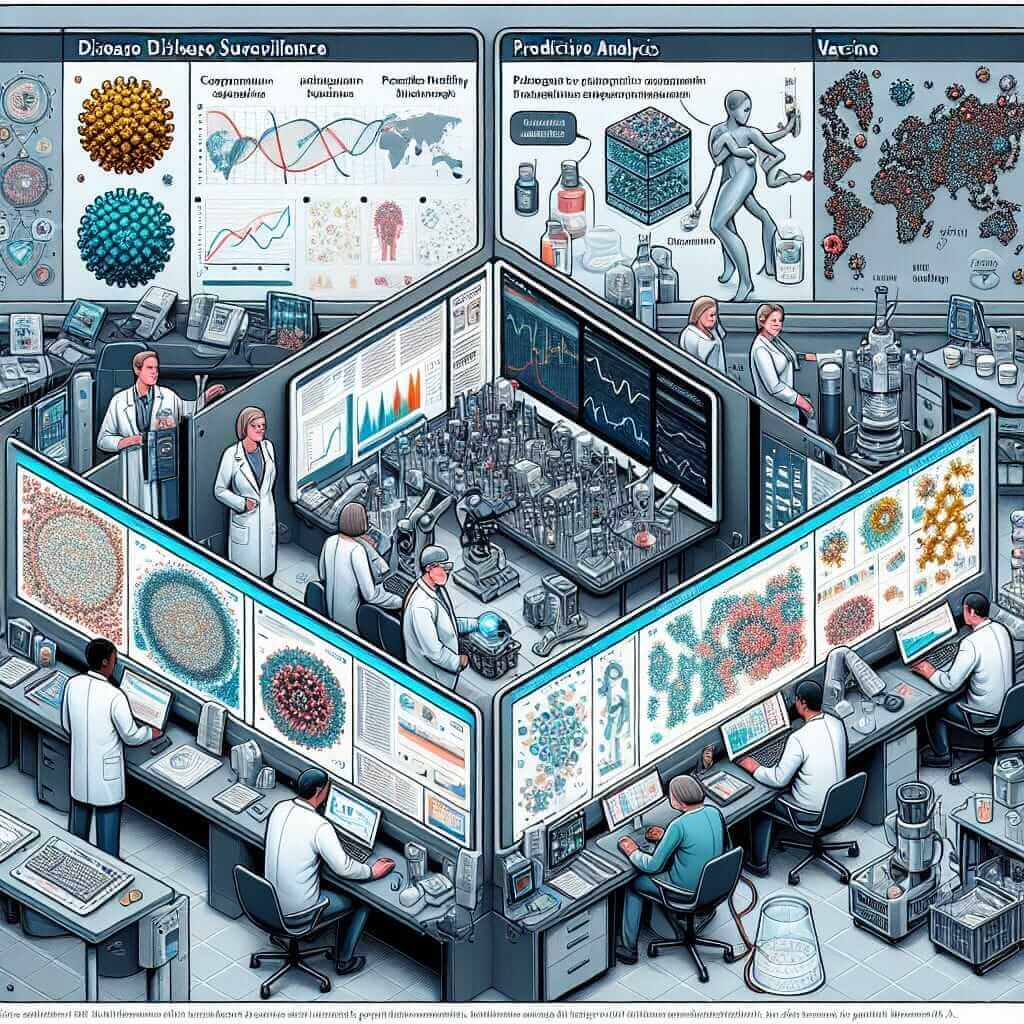The IELTS Reading section tests your ability to understand and analyze various types of texts. Among the numerous topics that can appear, “AI in public health initiatives” is a timely and relevant subject. With the increasing role of artificial intelligence (AI) in healthcare, it’s valuable to familiarize yourself with this topic. Historically, public health and technology subjects have repeatedly featured in IELTS exams, making it a high-potential topic for future tests. Let’s delve into it and create a comprehensive reading exercise.
AI in Public Health: Practice Reading Passage & Questions
Reading Passage
Title: How is AI being used in public health initiatives?
Artificial Intelligence (AI) is revolutionizing public health initiatives around the globe. By applying machine learning algorithms, predictive analytics, and other AI technologies, public health departments are better equipped to monitor, predict, and respond to health crises.
One of the most notable applications of AI in public health is in disease surveillance. Traditional methods of tracking disease outbreaks involve manual data collection and reporting, which can be slow and inefficient. AI can analyze vast datasets from diverse sources, such as social media, wearable devices, and electronic health records, to detect early signs of disease outbreaks. For example, AI algorithms were instrumental in identifying the early spread of COVID-19, enabling quicker responses and limiting the virus’s spread.
Predictive analytics is another critical area where AI is making an impact. Health organizations use AI to predict the spread of diseases and prepare for potential outbreaks. By analyzing historical data and identifying patterns, AI can forecast future health threats and help allocate resources more effectively. This proactive approach has been crucial in managing limited medical supplies and staffing during pandemics.
AI is also enhancing vaccine development. Traditional vaccine development is a lengthy and complex process, but AI can expedite this by predicting protein structures, identifying potential antigens, and simulating human responses to vaccines. During the COVID-19 pandemic, AI accelerated the research and development timeline, leading to faster deployment of effective vaccines.
Furthermore, AI-powered telehealth services are widening access to medical care. Telehealth platforms equipped with AI can provide preliminary diagnosis and treatment recommendations, reducing the burden on healthcare facilities and offering remote consultations to patients in underserved areas.
Despite its potential, the integration of AI in public health initiatives comes with challenges. Data privacy concerns, the need for substantial computing power, and the potential for algorithmic bias are significant barriers. Addressing these issues is essential to fully harness AI’s capabilities for improving public health outcomes.
In conclusion, AI is transforming public health initiatives through enhanced disease surveillance, predictive analytics, accelerated vaccine development, and improved access to healthcare services. Continued advancements and careful management of challenges will be pivotal in maximizing the benefits of AI in public health.
Questions
Multiple Choice
-
What is one significant benefit of AI in public health?
A. Reducing healthcare costs
B. Enhanced disease surveillance
C. Building new hospitals
D. Training more doctors -
How did AI contribute to the COVID-19 pandemic response?
A. By developing new social media platforms
B. By providing manual data collection tools
C. By identifying early signs of outbreaks
D. By replacing traditional tracking methods entirely
True/False/Not Given
- AI can predict the spread of diseases by analyzing historical data. (True/False/Not Given)
- AI has removed the need for vaccines in some cases. (True/False/Not Given)
Sentence Completion
- AI-powered telehealth services can provide ___ and treatment recommendations, widening access to medical care.
Short Answer Questions
- What are some of the challenges mentioned in the text that come with integrating AI in public health?
Answer Key
Multiple Choice
-
B. Enhanced disease surveillance
- Explanation: The text explicitly mentions that one notable application of AI in public health is enhancing disease surveillance.
-
C. By identifying early signs of outbreaks
- Explanation: The text states that AI was instrumental in identifying the early spread of COVID-19.
True/False/Not Given
-
True
- Explanation: The passage explains that AI uses historical data and patterns to predict disease spread.
-
Not Given
- Explanation: The text does not mention AI removing the need for vaccines entirely.
Sentence Completion
- preliminary diagnosis
- Explanation: The text indicates that AI-powered telehealth can provide preliminary diagnosis and treatment recommendations.
Short Answer Questions
- Some challenges are data privacy concerns, the need for substantial computing power, and the potential for algorithmic bias.
- Explanation: These are explicitly listed as challenges in the text.
Common Mistakes and Tips
- Mistakes: Misinterpreting the information, not differentiating between true/false/not given, and overlooking specific details.
- Tips: Skim the text first to get a gist, then read questions carefully. Pay attention to keywords and always refer back to the text for answers.
Vocabulary
- Surveillance (noun): /səˈveɪ.ləns/ – close observation, especially of a suspected spy or criminal
- Predictive analytics (noun): /prɪˈdɪk.tɪv æn.əˈlɪt.ɪks/ – the branch of data analytics that provides predictions about future outcomes based on historical data.
- Telehealth (noun): /ˈtɛl.i.hɛlθ/ – the provision of healthcare remotely by means of telecommunications technology.
- Proactive (adjective): /prəʊˈæk.tɪv/ – creating or controlling a situation by causing something to happen rather than waiting to respond to it after it happens.
Grammar
- Conditional Clauses: If AI can analyze vast datasets, it can detect early signs of outbreaks.
- Formula: If + present simple, + present simple (for general truths).
- Example: If you study hard, you will succeed.

Conclusion and Advice
To excel in the IELTS Reading section, practice is key. Familiarize yourself with a range of topics, from technology to public health, as they frequently appear in exams. Use the strategy of skimming the passage first, followed by a thorough reading to answer specific questions. Regularly practicing answering different question types will greatly enhance your speed and accuracy.
For more articles on related subjects, you can explore our pieces on How climate change is influencing global public health initiatives and How technology is influencing global health initiatives.
Keep practicing, and good luck with your IELTS preparation!